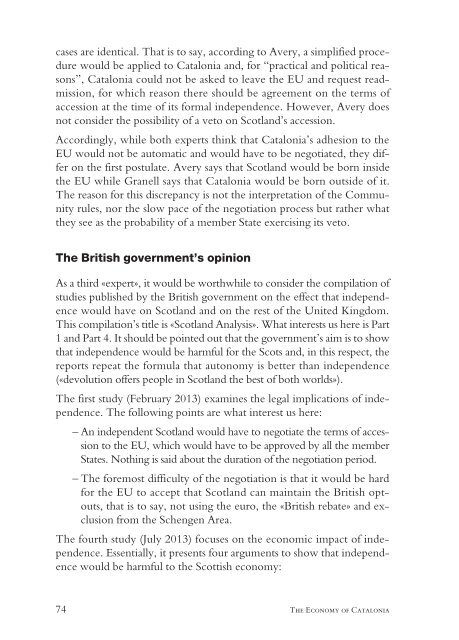The Economy of Catalonia
the_economy_of_catalonia._questions_and_answers_on_the_economic_impact_of_independence
the_economy_of_catalonia._questions_and_answers_on_the_economic_impact_of_independence
Create successful ePaper yourself
Turn your PDF publications into a flip-book with our unique Google optimized e-Paper software.
cases are identical. That is to say, according to Avery, a simplified procedure<br />
would be applied to <strong>Catalonia</strong> and, for “practical and political reasons”,<br />
<strong>Catalonia</strong> could not be asked to leave the EU and request readmission,<br />
for which reason there should be agreement on the terms <strong>of</strong><br />
accession at the time <strong>of</strong> its formal independence. However, Avery does<br />
not consider the possibility <strong>of</strong> a veto on Scotland’s accession.<br />
Accordingly, while both experts think that <strong>Catalonia</strong>’s adhesion to the<br />
EU would not be automatic and would have to be negotiated, they differ<br />
on the first postulate. Avery says that Scotland would be born inside<br />
the EU while Granell says that <strong>Catalonia</strong> would be born outside <strong>of</strong> it.<br />
<strong>The</strong> reason for this discrepancy is not the interpretation <strong>of</strong> the Community<br />
rules, nor the slow pace <strong>of</strong> the negotiation process but rather what<br />
they see as the probability <strong>of</strong> a member State exercising its veto.<br />
<strong>The</strong> British government’s opinion<br />
As a third «expert», it would be worthwhile to consider the compilation <strong>of</strong><br />
studies published by the British government on the effect that independence<br />
would have on Scotland and on the rest <strong>of</strong> the United Kingdom.<br />
This compilation’s title is «Scotland Analysis». What interests us here is Part<br />
1 and Part 4. It should be pointed out that the government’s aim is to show<br />
that independence would be harmful for the Scots and, in this respect, the<br />
reports repeat the formula that autonomy is better than independence<br />
(«devolution <strong>of</strong>fers people in Scotland the best <strong>of</strong> both worlds»).<br />
<strong>The</strong> first study (February 2013) examines the legal implications <strong>of</strong> independence.<br />
<strong>The</strong> following points are what interest us here:<br />
– An independent Scotland would have to negotiate the terms <strong>of</strong> accession<br />
to the EU, which would have to be approved by all the member<br />
States. Nothing is said about the duration <strong>of</strong> the negotiation period.<br />
– <strong>The</strong> foremost difficulty <strong>of</strong> the negotiation is that it would be hard<br />
for the EU to accept that Scotland can maintain the British optouts,<br />
that is to say, not using the euro, the «British rebate» and exclusion<br />
from the Schengen Area.<br />
<strong>The</strong> fourth study (July 2013) focuses on the economic impact <strong>of</strong> independence.<br />
Essentially, it presents four arguments to show that independence<br />
would be harmful to the Scottish economy:<br />
74 <strong>The</strong> <strong>Economy</strong> <strong>of</strong> <strong>Catalonia</strong>


